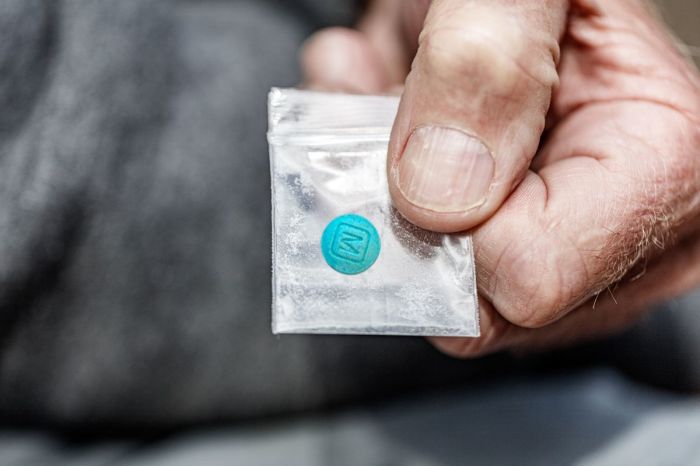About half of Americans know someone with an opioid addiction: survey

A new survey suggests that about half of Americans know someone with opioid addiction, and nearly a quarter are afraid they might become addicted as abuse of the drug continues to impact millions of families nationwide.
The survey from Bicycle Health was conducted in July, assessing 1,103 people ages 18 to 82, with an average age of 36. Forty-eight percent of survey respondents were women, 50% were men and another 2% were nonbinary.
According to the survey, 49% of Americans know at least one person with an opioid addiction, with 46% saying they had a friend with an addiction. Another 37% said that they had an extended family member who struggles with opioid addiction, while 27% reported having an acquaintance that does.
Twenty-two percent said they have an immediate family member who struggles with opioid addiction, and 7% of those surveyed said they have a neighbor or co-worker addicted to opioids.
For 39% of people who have a loved one suffering from opioid addiction, they admitted feeling scared to talk about the addiction. The reasons given were not knowing how to approach it, worried their loved one will become mad or they fear talking about it won't help.
Fifty-two percent of respondents said they're afraid someone they know could become addicted to opioids. Additionally, 22% of Americans are worried they'll become addicted to opioids.
For this reason, 41% said they avoid opioids for surgery or pain, and 54% would choose over-the-counter medicines instead of prescription painkillers.
The survey report cited data from a 2019-2020 Kaiser Foundation study, which found that over 1.7 million Americans struggled with opioid use disorder.
Washington, D.C., has the highest percentage of people dealing with opioid use disorder, with 1.7% of the district's population reporting addiction to opioids within the study's timeframe.
The East Coast also reported a high percentage of opioid addictions, with at least one out of every 100 people addicted to opioids in Delaware (1.3%), Connecticut (1.1%), Maine (1%) and Pennsylvania (1%).
However, some of the other highest rates of OUD across the United States were in Alabama (1.6%), Nevada (1.2%) and Ohio (1.2%).
States with the lowest numbers of OUD vary, with just 0.1% of the South Carolina, Nebraska and Minnesota population reporting addiction to opioids.
Still, as the survey noted, this accounts for 11,000 people, and the data only includes those who have admitted to their addiction.
Regarding accessibility to opioid addiction treatment, the survey reports five states with the most doctors available to prescribe Buprenorphine, which is often used to treat OUD. The states include California, New York, Massachusetts, Florida and Washington.
Despite being the second most populous state, the survey notes that Texas only reports 45 doctors accepting new patients for opioid addiction treatment.
In terms of the seriousness of the issue, 71% of Americans believe the country is facing an opioid addiction crisis, and 72% think there needs to be more accessible access to care.
The share of Americans who think that opioid addiction has become a major problem appears to reflect the results of another national survey of 1,000 likely U.S. voters.
The survey, conducted by Pulse Opinion Research LLC for Rasmussen Reports from Sept. 26 to Sept. 27, found that 91% of participants believe the country's fentanyl issue is serious, with 73% describing it as a "very serious problem." Fentanyl is an opioid drug exponentially more potent than heroin and morphine.
Fentanyl overdose is the leading cause of death among adults ages 18-45 in the U.S., according to analysis of data from the U.S. Centers for Disease Control and Prevention.
According to a May report from the CDC, overdose deaths from opioids increased from over 70,000 in 2020 to over 80,000 in 2021. Over 71,000 of those 2021 opioid deaths came from overdoses of synthetic fentanyl, up from around 57,000 in 2020.
In October 2017, the U.S. Department of Health and Human Services declared a nationwide public health emergency for opioid addiction at the request of former President Donald Trump.
The HHS reported in 2021 that over 10.1 million people had misused prescription opioids in the previous year, with an estimated 40% of opioid overdose deaths involving a prescription opioid.
Samantha Kamman is a reporter for The Christian Post. She can be reached at: samantha.kamman@christianpost.com.





























